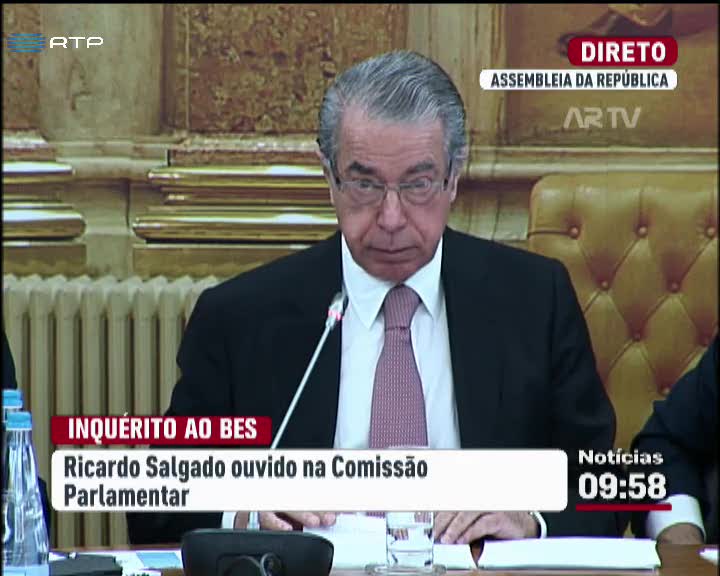MPs questioned BES boss Ricardo Salgado for 10 hours in 2014
With Ricardo Salgado – the main defendant in the open-ended trial that has begun into the collapse of Portugal’s largest private bank – now unable to defend himself due to Alzheimer’s disease, judges today will be listening to recordings of the 10-hour grilling he underwent at the parliamentary inquiry four months after the bank had been wrestled out of BES control 10 years ago beginning the downward spiral that was to cost so many billions of euros.
In other words, they will be able to hear Ricardo Salgado as he was then; before his memory and mind became so badly affected by his medical condition – and when he truly believed that the charges against him were beyond harsh.
His opening statement to the inquiry is not being recalled by reports today, but it is fascinating to look back at reports at the time, and see what he said, and how he was seen to be behaving.
Observador reports that Mr Salgado told MPs: “For weeks and months on end, my family and I were summarily judged in the court of public opinion with accusations of illegalities, of hundreds of billions of euros escaping in a matter of weeks to enrich ourselves in offshore companies, of personal fortunes hidden in Asia, of mansions in Miami and castles in Scotland. All totally false stories that ended up hiding the truth of the matter”.
The online reports that “during his defence, he cast out in all directions: he blamed Álvaro Sobrinho and his management of BES Angola (BESA) – a ‘sore point’ for the group’s contamination; he accused accountant Francisco Machado da Cruz of having hidden the liabilities of Espírito Santo International (ESI) from the bank’s management; he guaranteed that the governor of the Bank of Portugal was one of those responsible for the destruction of BES’s capital, for the haste in resolving the problems and for forcing through excessive provisions; and also the government for having ‘unwaveringly’ refused to help the Group before it collapsed.
“The only thing Ricardo Salgado didn’t talk about was his family: ‘Don’t count on me to attack anyone in my family,” the former BES chairman repeated several times.
“Calm and in constant dialogue with the lawyers who made up his entourage, he answered (almost) all of the MPs’ questions – in others he invoked the secrecy of justice or Angolan laws that prohibit the disclosure of bank data from Angolan entities – and always refuted the accusations that he was the main culprit in the crisis that devastated the bank and the Espírito Santo Group (GES)”.
These are all observations that 10 years on no doubt will be brought up by defence lawyers.
One of Observador’s observations back in December 2014 was that MPs were ‘irritated’ by the ‘drawn out’ and ‘slow’ tone with which the former bank president answered questions. They ‘complained’ that this was a “concerted strategy by the defence to drag out the committee of inquiry, and wear down the auditorium”.
But could it have been a sign that Ricardo Salgado was already falling victim to the disease that has left him today unable to recall his correct address, or his mother’s full name?

There is so much that will start coming out in this enormous, complex case that may end up lasting years, not months.
For now, Mr Salgado remains the ‘main defendant’, on trial for 62 offences (three have lapsed), allegedly committed between 2009 and 2014. Among the offences are one of criminal association, 12 of active corruption in the private sector, 29 of qualified fraud, five of infidelity, one of market manipulation, seven of money laundering and seven of document forgery
There are also 17 other defendants: namely Amílcar Morais Pires, Manuel Espírito Santo Silva, Isabel Almeida, Machado da Cruz, António Soares, Paulo Ferreira, Pedro Almeida Costa, Cláudia Boal Faria, Nuno Escudeiro, João Martins Pereira, Etienne Cadosch, Michel Creton, Pedro Serra and Pedro Pinto, as well as the companies Rio Forte Investments, Espírito Santo Irmãos, SGPS and Eurofin.
Introductory statements by these defendants’ lawyers are also scheduled to be finalised today.
According to the Public Prosecutor’s Office, the collapse of the Espírito Santo caused losses of more than €11.8 billion – but elsewhere Público has bumped this total up to €18 billion.
Writing yesterday, the paper dubbed the trial “a reckoning with justice: a reckoning for Portugal with itself. Ten years on, the accused are sitting in the dock, but a huge trail of destruction has already been left behind. BES cost the Portuguese more than €18 billion, which is more than they spend in a year on the SNS (national health service). BES took down dozens of companies, including Portugal Telecom, and thousands of jobs. BES cheated clients who are still waiting to recover their investments.
Público concludes: “There are good reasons to believe that today’s country is more transparent and healthy. There no longer seems to be any room for masters. Banking supervision, imposed by the European institutions, is more robust and attentive. Portuguese banks are dedicated to doing what they do best, without trying to create business networks where slush funds for corruption circulate. The BES case is nevertheless a subject for reflection. To make sure it never happens again”.
natasha.donn@portugalresident.com




















